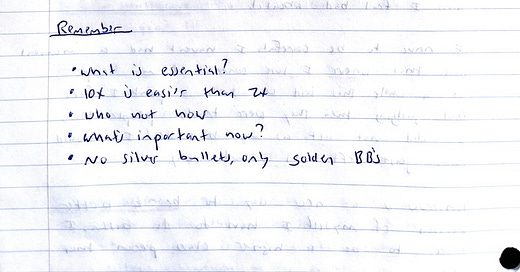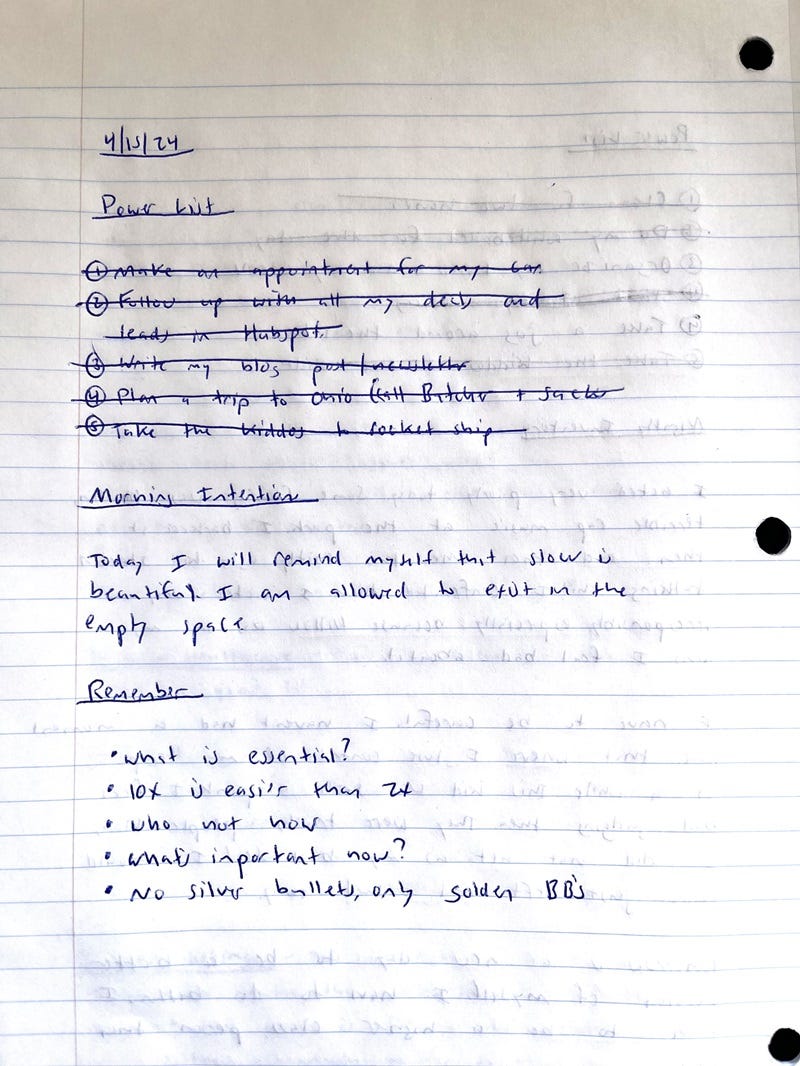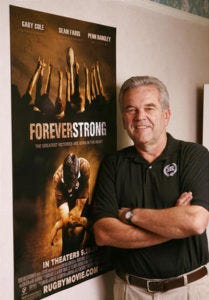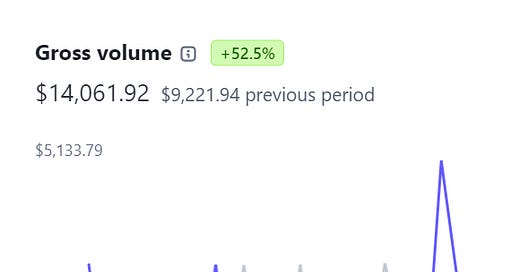
My 5 Most Important Business Principles
Towards the end of last year, my wife gave me an intervention. She told me that I was working too hard and through our conversation, I saw that I was heading down the wrong path.
If I didn’t make a change, I was going to end up being one of those rich guys, who achieved all his goals but missed out on living life in the process.
I took take my wife seriously. My vision is to make my businesses work for me, and not to spend my life working for my businesses.
As such, over the last nine months, I have been actively and purposefully trying to lighten the load, be more present, and not put so much pressure on myself.
Since embarking on the journey of business mindfulness, I have discovered 5 principles that have completely changed my life.
I write these 5 principles in my notebook every morning as a daily reminder to myself and as a way to set the intentions for the day.
Although I have a long way to go, I can say with certainty that these principles have helped me manage my fear, my worry, and my anxiety, especially as it pertains to money and feeling like I never have enough.
In this week’s issue, I will share these 5 principles with you, and give you insight as to how you can add these principles into your own decision making processes.
LFG.
1. What Is Essential?
I learned this philosophy from reading the book “Essentialism” written by Greg McKeown. Reading this book was a real breakthrough moment in my career as an entrepreneur.
I’m always doing too much. Most of what I decide to work on, I do because it makes me feel better. It’s purely emotional. In most cases, there has been little intentionality behind my actions.
After reading this book, I started actively looking at my actions and asking myself … “is this essential?“ The book taught me to look at my work through the lens of less but better.
Most of the time, what I am working on is not essential. Most of what I have done hasn’t moved the needle or contributed to my higher calling at all. I’ve recognized that I remain in constant motion because I’m anxious and restless and I find it difficult to be still.
I have no regrets. I am grateful for all the lessons I have learned along the way. With that said, it’s clear to me now that I have spent a lot of time and energy in places that simply don’t matter.
I know many of you reading this can relate. I can’t be the only one who is constantly fighting off the voices in my head that tell me I’m not good enough. Staying busy is a good way for me to show myself (and those around me) that I am good enough. I’ve battled these voices through brute force, but it’s an ineffective long term strategy.
This book had a huge impact on me, and the principle of essentialism is the foundation on which the other 4 principles are built on.
If you feel like I feel, than this book might be what you’re looking for.
2. 10X Is Easier Than 2X
I discovered this principle in Thailand and it completely rocked my world.
I learned this lesson from the book of the same name, obviously called 10X Is Easier Than 2X. It was written by Dan Sullivan and Benjamin Hardy.
The book makes the argument that it’s easier to grow at scale than it is to grow linearly. In addition, the book argues that hard work is the least important factor in determining how much growth you are able to attain in your business.
For instance, the woman running the pizza shop down the street is working just as hard (in many cases, she’s working harder) than the woman running a $100M venture fund.
I believe in hard work and I believe in effort. However, I also recognize that hard work is the default. All successful people work hard. But growing by 10X is a matter of leverage, decision making, and judgement.
Generating 10X growth is about deciding where to focus your energy and what you decide to work on, much more than it’s about effort.
Since reading this book, I’ve started auditing where I spend my time and I am asking myself if what I am working on is part of the 20% of work that generates 80% of the results.
As I said, I read this book in Thailand just after I read Essentialism, and it was one of those moments in life where I realized that my higher power is trying to teach me something and I had better listen.
The combination of those two books taught me that I can work less and succeed more. In fact, if I want to achieve my business goals, I have to force myself to work less.
3. Who Not How
After reading 10X Is Easier Than 2X, I instantly knew that I needed to learn more of Dan Sullivan’s teachings.
Who Not How is a book that highlights how ineffective it is to try and solve your own problems, and how much more effective and beneficial it is to instead focus on finding other people who have the skillset you require.
This book has a slight contradiction, because I absolutely believe that the most important indicator of your success is your skill stack. If you want to succeed in life, you have to be armed with the required skills.
what can you do?
how can you add value to the marketplace?
why would anyone want to work with you?
These questions are unavoidable. There are no shortcuts in business. If you want to get rich, you need to be the type of person who knows how to get rich. You do this through using your skills to help others.
However, there is a limit to how much you can do with a skill set. Eventually, in order to scale, you need to build a team. Once you start building a team, you will see very quickly how much easier it is to surround yourself with people who have the skills that you don’t have. Why learn everything when you can simply find people who know how to do what you don’t know how to do?
You can’t do it all, no matter how much you try. This was a difficult realization for me, but I’m grateful I learned it now instead of 10 years from now.
Since reading this book, any time there is a problem or a gap in my company, Bryan, Tricia, and I first seek to find a person who can solve the problem for us. We very rarely try to solve problems ourselves.
In fact, every time we actively try to solve our own problems, we I end up making it worse.
4. What’s Important Now?
Coach Larry Gelwix led Highland High School’s rugby team to 418 wins, 10 losses and 20 national championships over 36 years. When asked how he does it, he replies, “We always win.”
At first glance, Coach Gelwix’s answer might seem arrogant. But what he was referring to what the acronym of “W.I.N.”
It stands for what’s important now?
Before learning about this philosophy, we used to live by the principles of “do what’s right in front of you.” This would keep us from getting overwhelmed and trying to do too many things at once. However, that principle doesn’t rank order the importance of what’s in front of us.
We have since changed our viewpoint to “what’s important now?”
This way, we remain focused on the task at hand while routinely analyzing what the next most important action for us to take is.
I want you to sit quietly and think of all the things you can possibly do at this moment.
Take a moment and think about what you will do next. Will you …
move and go somewhere?
sit still?
open Instagram?
work on a proposal?
Why?
Why did you decide to do what it is you decided to do?
What’s important now is a principle that takes all the guess work out of your day and your focus. You don’t have to decide what to do next as much as you have to analyze what you want. Once you decide what your objective is, it becomes very clear what the next most important action step is for you to execute on.
It works. Out of the 5 principles I’ve incorporated into my life, this one has been the most helpful in quieting my mind.
5. No Silver Bullets, Only Golden BB’s
Alex Hormozi taught me this lesson.
I don’t know why, but I genuinely like Hormozi. For some reason he comes across as authentic and I appreciate it. I owe him a huge debt of gratitude for introducing this philosophy into my life.
One of the biggest problems in my company over the years has been how I’ve tried to introduce and execute on improvements. I’ve always made the mistake of trying to revamp departments and make big changes.
Although the changes and improvements we wanted to make were needed, the way we executed on improvements was stressful and ineffective.
“No silver bullets’ only golden BBs” is a daily reminder that small improvements over time create huge results.
What’s more, is that these improvements have a compounding effect. It’s not as though improvements are linear. Everything in life compounds, so if you focus on golden BBs your growth curve looks like this.
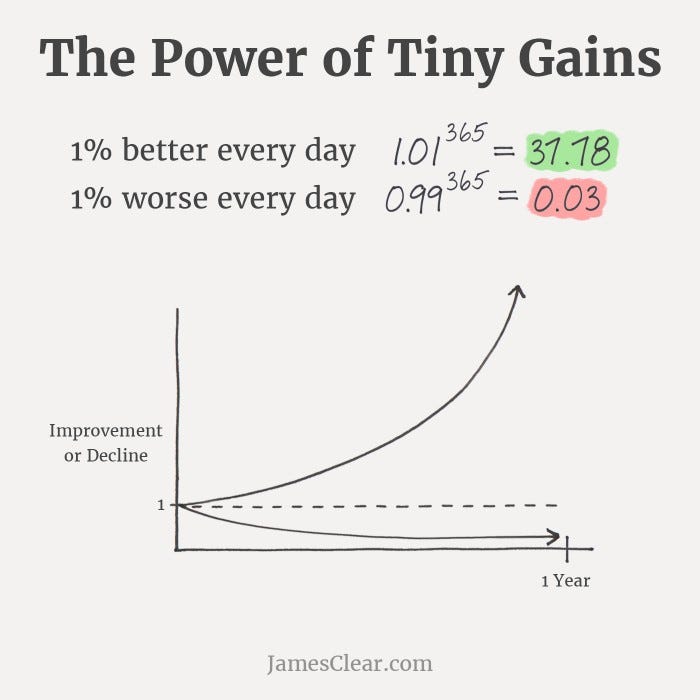
The best part about shooting golden BBs is the lack of stress. There’s nothing more stressful than tearing something down and rebuilding it in the way you think it needs to be.
When you make big improvements in a department or a process, you accidentally create two problems.
You stress everyone out because the company can’t stop running while you finish whatever project you’re working on.
You fail to make the improvement you actually want because by the time you’re finished, another variable that you didn’t expect has entered the equation.
Business is fluid and constantly changing. Every day, we are reacting to changes and making adjustments. It’s never the case that we can build something that fits perfectly into the system and therefore has a long lifespan.
Big improvements create more problems then they solve.
I can’t tell you how many times I have tried something, it didn’t work, and then I decided to quit and try something new. But I was stuck in the habit because it’s more emotionally rewarding to start start a new project than it is to continue making small improvements over time.
The end result is a machine that is constantly optimizing and improving in a way that requires little effort. The machine is fluid and flexible.
Golden BBs is the ticket to low stress success.
Are You Noticing A Theme Here?
Something happened to me over the last year.
Maybe it’s from becoming a dad or maybe it’s that I am getting older. But suddenly, it became clear to me that the way I have been operating up until this point wasn’t going to work for me much longer.
I built my success by working harder than everyone else. Every day I woke up and put in the hours. I built my company (with help from my team and partners) one heavy ass brick at a time.
Eventually, the stress and anxiety started catching up to me and I knew I had to make a change. I started seeking out ways to accomplish more, while doing less. As soon as I made the choice to take this seriously, my higher power has continuously sent me signals and lessons to keep me on the right path.
What’s most amazing to me is how much more effective it is to do less.
All my life, I thought I needed to work the hardest. And although I believe that hard work is what got me to where I am, I am grateful to discover that hard work won’t get me to where I want to go.
It’s been true for me. I know it will be true for you.
The post My 5 Most Important Business Principles appeared first on Tim Stoddart.

